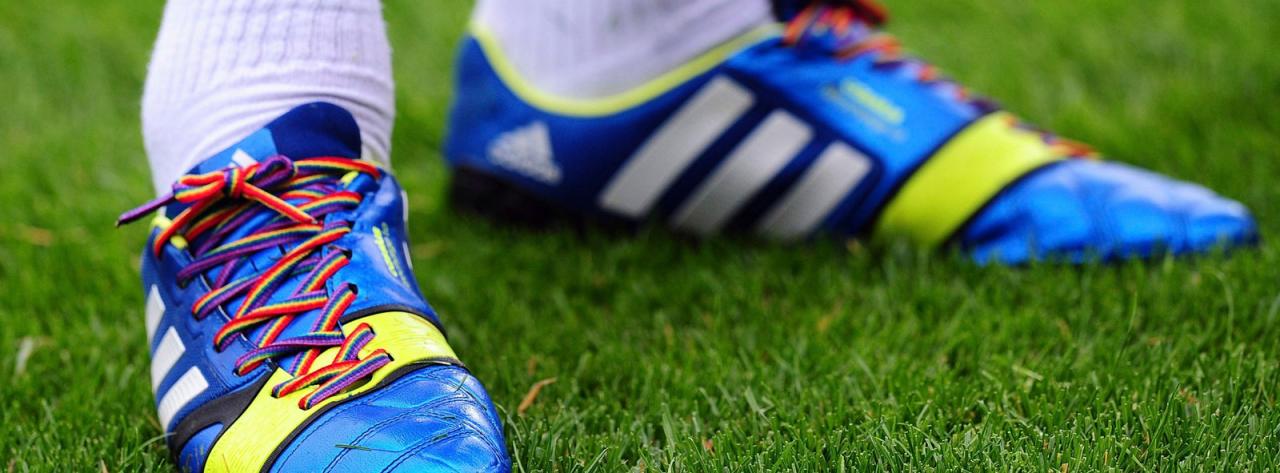One in five UK football fans would be ’embarrassed’ if their favourite player came out as gay
By Will Stroude

While the Olympics and Paralympics have been a triumph for LGBT athletic success, a new Stonewall survey has found that anti-LGBT abuse is still a problem within the world of English football.
The study found that 72% of fans have heard homophobic abuse at the sport, while around one in five respondents aged 18-24 would be embarrassed if their favourite player came out of the closet. Respondents in the younger age bracket were also more likely to view homophobic banter within the sport as harmless.
There are currently no out professional footballers in Britain. Justin Fashanu, who came out during his professional career, ended his life, while former Attitude cover star Robbie Rogers continued his career as an out player in America (where he has still been subjected to homophobic abuse).
“While the majority of people see homophobic chants and abuse as a problem, and want to see sport become more welcoming of lesbian gay, bi and trans players and fans, there is a persistent minority who believe this sort of abuse is acceptable,” said Ruth Hunt, Stonewall’s chief executive.
“These vocal few may be under the illusion that anti-LGBT language is harmless but it makes lesbian, gay, bi and trans fans and players feel unsafe, unwelcome and unable to be themselves.
“We need high profile sports clubs and personalities to stand up as allies and help make sport everyone’s game by showing that homophobic abuse has no place in sport.”
Last year, betting sites offered odds on which footballers would come out of the closet after the British press reported that two prominent players were considering it. Stonewall since described placing odds on this as “trivialising” the issue.
The findings show that anti-LGBT abuse is still a problem within the game, but there were some “encouraging trends” in the research: 88% of fans said they would be “proud” or “neutral” if their favourite player came out and 59% of respondents recognized anti-LGBT language as a problem, while 63% said more should be done to make LGBT people feel welcome in the world of sport.
Almost three quarters (72%) of British football fans say they have heard homophobic abuse, according to new research that suggests such views are still prevalent in sport.
The study by Stonewall also found one in five sports fans aged 18-24 would be embarrassed if their favourite player came out and that young people were more likely to see homophobic “banter” as harmless.
Stonewall’s research into homophobic, biphobic and transphobic attitudes and experiences among sports fans found that young people were twice as likely to say they would be embarrassed if their favourite player came out as gay (22%) compared to the 12% average for all age groups.
The younger age group were also twice as likely to agree that anti-LGBT language is harmless if it’s just intended as “banter”.
Stonewall’s Chief Executive Ruth Hunt said there was a “persistent minority” of sports fans who think homophobic abuse is acceptable.
“These vocal few may be under the illusion that anti-LGBT language is harmless but it makes lesbian, gay, bi and trans fans and players feel unsafe, unwelcome and unable to be themselves,” she said.
No current Premier League football players are openly gay. Justin Fashanu, who played for clubs including Nottingham Forest in the 1980s and 1990s, revealed he was gay during his career. He later took his own life after being accused of sexual assault, reportedly fearing he would not get a fair trial because of his sexuality.
Stonewall have created a training programme for sports coaches who work with young people to help tackle the issues, as well as a sports toolkit for community groups to help build awareness of LGBT issues.
Almost two thirds of 18-24 year olds (60%) say that LGBT players coming out would have a positive impact on the culture of sport, and 63% of that group said they wished more sports players were open about their sexual orientation.
“We need high profile sports clubs and personalities to stand up as allies and help make sport everyone’s game by showing that homophobic abuse has no place,” said Hunt.
More stories:
Lady Gaga’s top 10 best music videos
Man leaves TripAdvisor review complaining about the amount of gay couples in Gran Canaria
